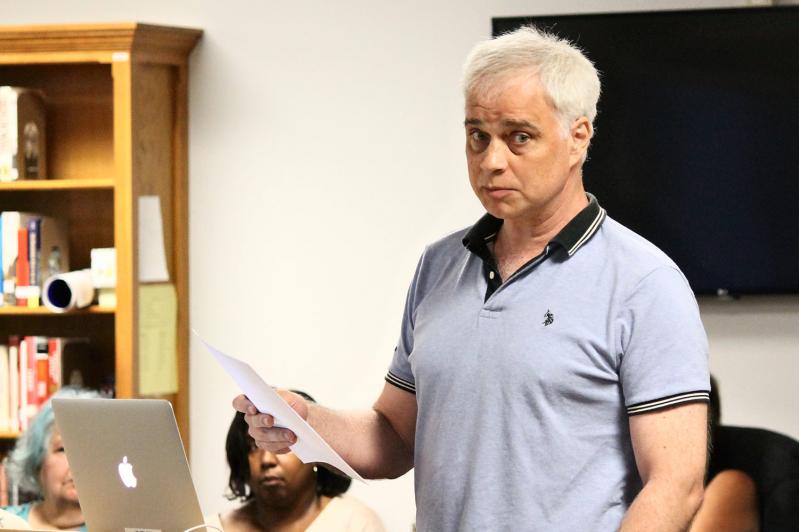The Sag Harbor School District was poised this week to send a letter to a New York State judge in support of delaying the start of the statewide elimination of the religious exemption for vaccines for schoolchildren but reversed its position on Tuesday after its superintendent said she had received legal advice to the contrary from the school attorney.
The school board on Monday narrowly passed a resolution giving Katy Graves, the superintendent, the authority to write and send such a letter to Acting Justice Denise Hartman in Albany County Supreme Court. The move was received with applause by several families that attended the meeting to plead with the board over the issue.
On Tuesday, the district sought and received legal advice from its attorney, Tom Volz, saying it should not send that letter. Ms. Graves instead sent a letter to the Sag Harbor school community at large, saying she had been advised against it.
“As a result, I am emotionally saddened to say this letter cannot be written for those families who spoke with so much passion and concern,” Ms. Graves wrote, “due to my responsibility to protect the Sag Harbor School District.”
Alex Coulter, a parent of two teenage boys who previously had religious exemptions, received Ms. Graves’s letter and summed up his thoughts yesterday by simply saying, “It’s disappointing.”
Mr. Coulter, who is now considering boarding school for his sons, was the first to the podium on Monday night when the Sag Harbor School Board opened up its meeting for public comment.
“This is capricious, vindictive,” he said of the vaccine requirement. “This is religious persecution of the first order.”
He provided the board with a packet of sample letters sent to the judge by other school officials in the state, including John V. Dolan, superintendent of the East Islip School District, as well as senior officials at several non-public schools.
In Albany yesterday, Judge Hartman was set to weigh a preliminary injunction that would delay the implementation of the new vaccine rule. In response to measles outbreaks, particularly in some religious communities, the New York State Legislature on June 13 passed a law repealing religious exemptions for students in schools — including private and parochial schools — that went into effect immediately. Since then, 55 families throughout the state banded together for legal action with the goal of overturning the state lawmakers’ decision. News reports have said about 26,000 children in the state have religious exemptions from mandatory vaccinations.
“They have a way that instead of treating things with a scalpel, they come at it with a hammer,” Mr. Coulter said of the State Legislature. “It’s a subject that needs to be talked about. It’s become taboo and it shouldn’t be. It’s one of the most important subjects facing this nation. . . . It’s basically going to be a very interesting time going forward if we have no more rights to our own health care anymore.”
Shona Gawronski, a mother of five children, including a rising senior at Pierson High School, called it a painful issue.
“It’s our children’s right to get educated regardless of what choices their parents have made,” she said during Monday’s school board meeting.
Alexandra McLaughlin said Monday she is facing the possibility of 17 years of homeschooling her two young children.
“This law has impacted my family, all of these families, so tremendously,” she said. “There is no way to feel the impact of these things until you have it happen to you, when something is taken away from you that you perhaps take for granted. . . . We’re not asking you to say you share our beliefs — nothing of a personal opinion other than you support children in their education. This is not necessarily going to erase the law. We really need the support.”
The five members of the school board who were present — Alex Kriegsman, the vice president, had left the meeting early, and Diana Kolhoff, a member, was absent — debated how to respond to the pleas of parents and even a student. Ms. Graves said at that time she supported writing a letter to the state.
“I think the letters that my fellow superintendents are writing are, ‘Wow, really poor implementation’ ” of the vaccine rule change, she said. “We have to uphold the laws of New York State — we have to, no doubt about it. We don’t get to change the laws, but we can write a letter saying the implementation of this isn’t good for families or children. Sometimes they have to hear how it impacts children and families.”
The board first turned down a resolution proposed by Chris Tice, one of its members, to support a two-year rollout of the vaccine change for families. The board later voted to give Ms. Graves the authority to send the judge a letter simply asking the state to consider a slowdown on the change. The board president, Jordana Sobey, voted “no” because she said she wanted to do more research on the subject. A majority of the full board would have had to approve it, and the four “ayes” meant it passed. The vote proved moot, however, following the legal advice on Tuesday from the district’s attorney.

